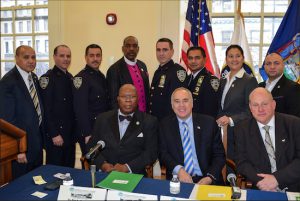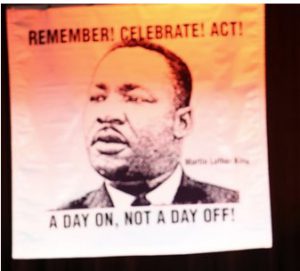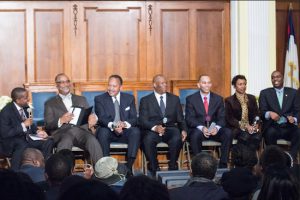
D.A. Thompson, Dr. Cornel West highlight BAM’s King celebration
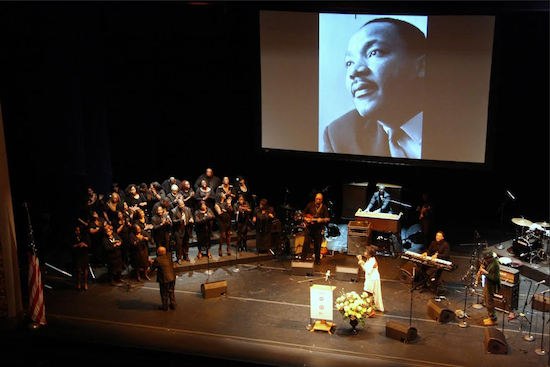
Brooklyn Academy of Music (BAM) commemorated Martin Luther King Jr. with a ceremony featuring patriotic and spiritual music from the New York Fellowship Mass Choir, which sang with Sandra St. Victor and Oya's Daughter. Eagle photos by Benjamin Preston
Monday morning marked the 29th annual Martin Luther King Jr. Day celebration hosted by the Brooklyn Academy of Music in cooperation with the Brooklyn Borough President’s office. BAM’s Howard Gilman Opera House was packed as the New York Fellowship Mass Choir opened the ceremony with rousing patriotic and spiritual music, including stirring renditions of the national anthem and “Lift Every Voice and Sing.”
The presentation included speeches from a number of political heavyweights from the city, state and national arenas: Brooklyn Borough President Eric Adams, who served as emcee, Mayor Bill de Blasio, Senators Chuck Schumer and Kirsten Gillibrand, Congressman Hakeem Jeffries, Brooklyn District Attorney Ken Thompson and Congresswoman Yvette Clarke. Dr. Cornel West, a well-known academic and activist, was the event’s keynote speaker.
The message of all those who took to the podium was clear: Dr. King left America an example to follow, but we still have a long way to go. The recent events in Ferguson, Mo., and closer to home, in Staten Island and Brooklyn, served as the basis of a discussion highlighting the poignancy of Dr. King’s life and work nearly 50 years after he was assassinated in Memphis, Tenn.
Tension between police and communities of color was a hot topic, and Rep. Jeffries said excess use of police force was still a problem.
Mayor de Blasio said that although his administration had faced stiff opposition in its efforts to do away with the police department’s controversial “stop and frisk” policy – many of the stops had been aimed at people of color – as well reducing the number of marijuana arrests, those changes had resulted in a lower overall crime rate. In 2014, he said, there were hundreds of thousands fewer police stops, and fewer marijuana arrests as well.
“There was an opportunity to focus on actual crime,” he said, adding that there were fewer murders last year. “We became safer because we became fairer.”
Honing in on disagreements last month between the de Blasio administration and the Patrolmen’s Benevolent Association over union contract negotiations, Adams, a 22-year veteran of the New York City Police Department, supported the mayor’s police policy decisions.
“When it comes time to select the policies to protect the people of New York, I did not elect the P.B.A., I elected Bill de Blasio,” he said.
For his part, the mayor defended the power of peaceful protest, and said that there have been instances when police and civilians have worked together, particularly last February, when members of the Crown Heights community helped officers find a bus fare evader who had shot one of the cops in both of his legs.
Mayor de Blasio closed his remarks with an optimistic quote from Dr. King: “The arc of the moral universe is long, but it bends toward justice.”
Rep. Jeffries held up Martin Luther King Jr. Day as a time for people to reassess their roles in effecting positive change in the world, adding that the Voting Rights Act, a key piece of federal civil rights legislation passed in 1965, would never have gone anywhere “without the agitation and the leadership and the troublemaking of Dr. King. In the name of Dr. King,” he said, “go out into the world and get into some good trouble.”
Seizing upon Dr. King’s famous words stating that “injustice anywhere is a threat to justice everywhere,” Rep. Clarke called for Americans to focus their attention upon injustice.
“We cannot allow our nation, or nations around the world, to ignore injustice,” she said, using Haiti, Syria, Nigeria, Ferguson, Mo., and even Brooklyn as examples of where to look.
District Attorney Thompson observed that Dr. King had shown the world what courage meant when he ignored death threats and violence and pressed for equal rights in America. Dr. King, said Thompson, stood up to injustices that had been a recurring theme throughout the nation’s history.
“Thank God there have always been men and women willing to stand up and fight against those injustices,” he said, calling for brave people to stand up and demand “a criminal justice system that dispenses justice evenly, without regard to race or where you live.”
Some of those injustices, several speakers observed, had endured to present times. Sen. Schumer said that our society had not yet reached a point where Martin Luther King Jr. Day could be a completely joyful celebration.
“As long as there’s bigotry and racism in America, it has to be a solemn day,” he said.
Dr. West – who used the writings of early 20th century author, sociologist and civil rights leader W.E.B. Du Bois as a framework for his talk about Dr. King’s example of using love and spiritual fortitude to effect change – took it a step further, saying that Dr. King’s memory had been sanitized. He even suggested that the holiday had become somewhat of a carnival.
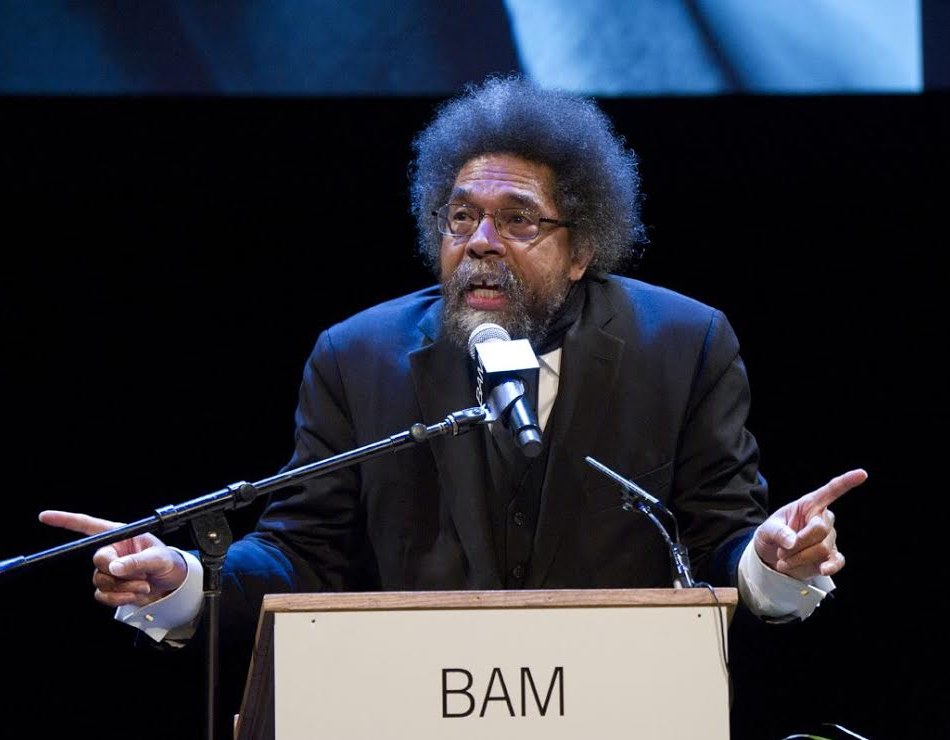
“Every year, you see him Santa Clausified,” Dr. West said. The real Dr. King, he said, was a man of flesh and blood and imperfections, albeit one filled with the “militant tenderness, subversive sweetness and radical gentleness” that enabled him raise his voice to demand not only the equal rights guaranteed by law, but the human dignity required by the spirit. Those spiritual needs, Dr. West said, were not being cultivated for today’s youth, who he said were uncared-for and in need of tending.
“If Martin came back, he would say, ‘My God, what a land of spiritual malnutrition; what a land of moral constipation.'”
Dr. West’s message, which included many old school soul and funk musical references, had been complemented by a mid-event performance by Sandra St. Victor & Oya’s Daughter, who played congruous 1970s tunes. Dr. West’s words seemed to draw strength from the music, and from his analogies. He said people needed to have the willingness to think critically and speak candidly, and closed with a rallying cry:
“We’re all in this together, Brooklyn. Let us never forget our dear brother.”
Leave a Comment
Leave a Comment

